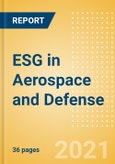There is a growing focus on aerospace & defense companies adapting to and managing their environmental, social, and governance (ESG) risks. Challenges such as climate change and human rights concerns are receiving increasing global attention. Due to air travel carbon emissions, the aerospace & defense industry, in particular, has been under intense scrutiny. Aircraft engines are now responsible for up to 2% of the world’s carbon output, and aerospace & defense primes will continue to use more sustainable technology and create fewer carbon emissions. Although environmental sustainability in defense might be expected to be relevant only to industry rather than the end-user, it is becoming increasingly important for modern militaries to also adopt sustainability strategies.
A variety of technologies and approaches are being developed to increase fuel efficiency and reduce carbon emissions. Sustainable aviation fuels (SAFs) are a promising alternative to traditional jet fuel, potentially reducing CO2 emissions by 80%. In the longer term, electric propulsion and hydrogen-powered aircraft will be the technologies that drive zero-emission aircraft.
In terms of social sustainability, the process of manufacturing weapons and aerospace platforms is resource-intensive, and deposits of rare minerals required are often concentrated in countries with problematic human rights records. Therefore, defense primes and militaries should seek to increase visibility and control over downstream supply chains. This is an opportunity for increased social performance and a stronger commitment to human rights as well as health and safety at all levels.
One of the main factors for technological advancement is to improve sustainability of both products and operations. Electric aircraft, hydrogen-powered aircraft and sustainable aviation fuels are key innovations that will shape the future of air travel. Improving social sustainability is vital for companies seeking to earn government contracts, increasing visibility and improving management throughout the whole supply chain will be vital. The defense industry is often susceptible to corruption and poor corporate governance can carry a high cost for companies both financially and regarding reputation.
Scope
Reasons to Buy
A variety of technologies and approaches are being developed to increase fuel efficiency and reduce carbon emissions. Sustainable aviation fuels (SAFs) are a promising alternative to traditional jet fuel, potentially reducing CO2 emissions by 80%. In the longer term, electric propulsion and hydrogen-powered aircraft will be the technologies that drive zero-emission aircraft.
In terms of social sustainability, the process of manufacturing weapons and aerospace platforms is resource-intensive, and deposits of rare minerals required are often concentrated in countries with problematic human rights records. Therefore, defense primes and militaries should seek to increase visibility and control over downstream supply chains. This is an opportunity for increased social performance and a stronger commitment to human rights as well as health and safety at all levels.
One of the main factors for technological advancement is to improve sustainability of both products and operations. Electric aircraft, hydrogen-powered aircraft and sustainable aviation fuels are key innovations that will shape the future of air travel. Improving social sustainability is vital for companies seeking to earn government contracts, increasing visibility and improving management throughout the whole supply chain will be vital. The defense industry is often susceptible to corruption and poor corporate governance can carry a high cost for companies both financially and regarding reputation.
Scope
- This report focuses on the importance of ESG sustainability throughout the aerospace & defense industry.
- ESG thematic research offers a detailed analysis of the various sustainability factors that are of importance to stakeholders and why businesses throughout the value chain should focus on improving their ESG responsibility.
- The research includes insightful industry analysis of ESG factors and key use cases highlighting how defense primes and militaries are integrating sustainable initiatives.
Reasons to Buy
- Corporations: Helps CEOs in all industries understand the disruptive threats to their competitive landscape.
- Investors: Helps fund managers focus their time on the most exciting investment opportunities in global Aerospace & Defense.
- Whilst most investment research is underpinned by backwards looking company valuation models, The publisher's thematic methodology identifies which companies are best placed to succeed in a future filled with multiple disruptive threats. Compared to all our rival thematic research houses, our unique differentiator is that our thematic engine has a proven track record of predicting leaders and challengers.
- Gain an in-depth understanding of how ESG factors are shaping the industry in the top spending countries across the world and identify the opportunities offered by each of them
- Strengthen your understanding of the market in terms of industry trends, challenges and the latest technological developments, among others.
Table of Contents
- Executive summary
- The Publisher's ESG framework
- Trends
- ESG challenges in aerospace & defense
- Case studies
- ESG timeline
- Companies
- Sector scorecard
- Glossary
- Further reading
- Our thematic research methodology
- About the Publisher
- Contact the Publisher
List of Tables
- Technology trends
- Macroeconomic trends
- Competitive position in the ESG theme
- Defense sector scorecard
- Thematic screen
- Valuation screen
- Glossary
- Further reading - The publisher's reports
List of Figures
- The Publisher's ESG framework
- Contributing factors and mitigating actions form part of our ESG framework
- The Publisher's ESG framework - environmental factors
- The Publisher's ESG framework - social factors
- The Publisher's ESG framework - governance factors
- The ESG story
Companies Mentioned (Partial List)
A selection of companies mentioned in this report includes, but is not limited to:
- Airbus
- BAE Systems
- Boeing
- L3Harris Technologies
- Leidos
- Lockheed Martion
- Northrop Grumman
- Raytheon
- Rolls Royce
- Safran
- SpaceX








